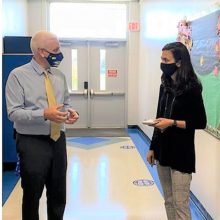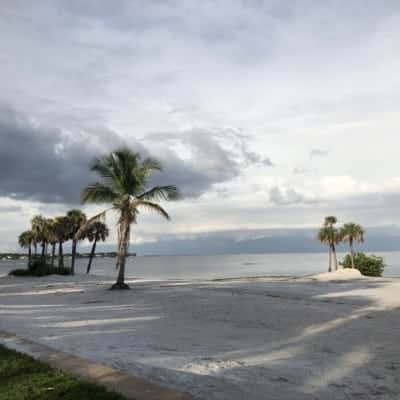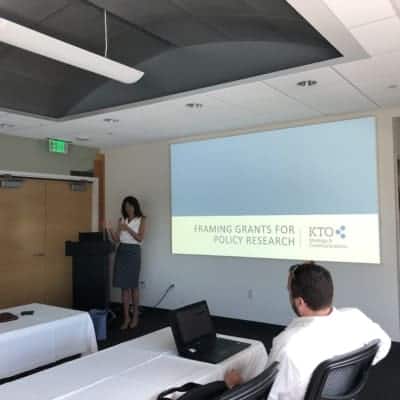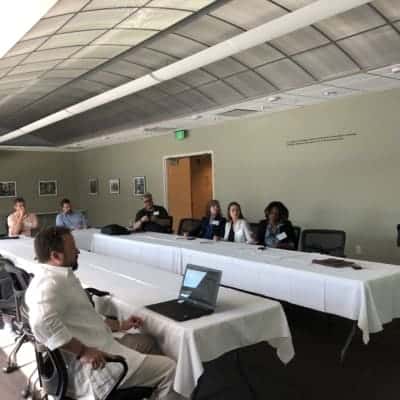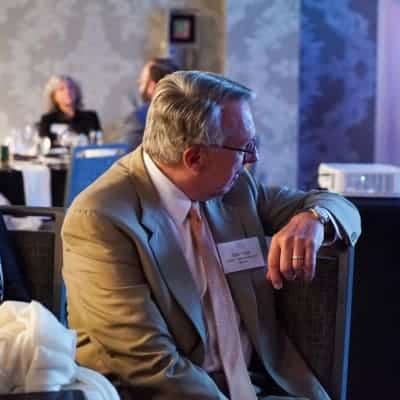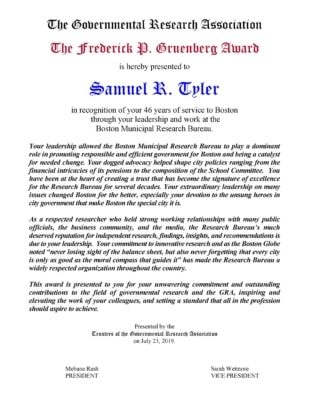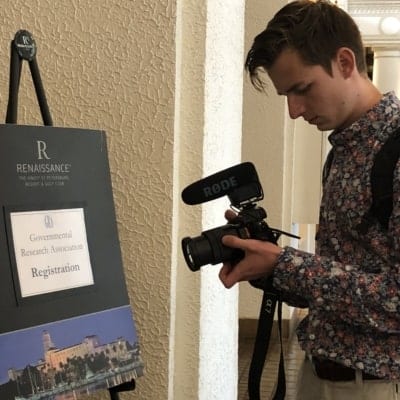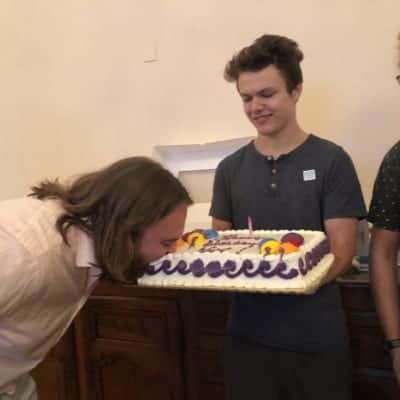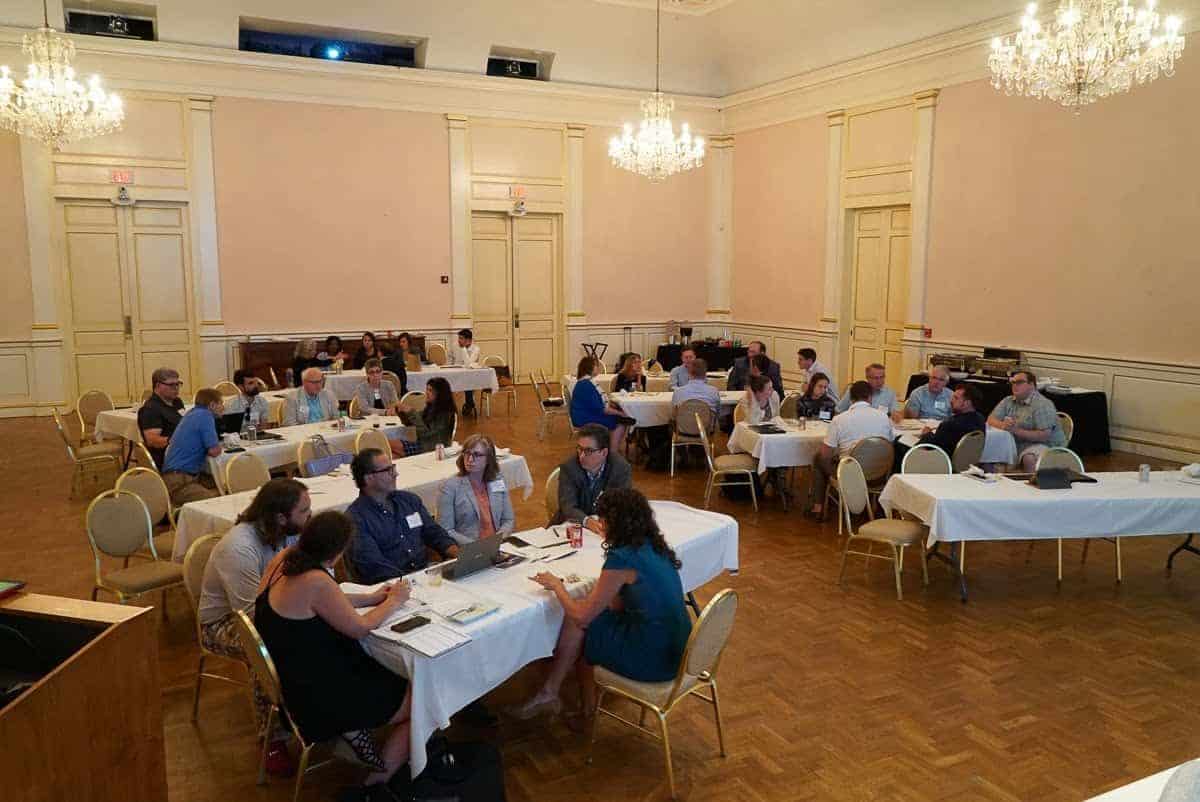

From July 21 to 24, members of the Governmental Research Association (GRA) gathered in St. Petersburg, Florida for the annual conference. Over the course of four days, meaningmakers and wayfinders from across the country heard from experts on issues ranging from energy regulation to starting wage to school leadership, and they had the opportunity to attend skills sessions.
Here we go #2019GRA! Thank you @FloridaTaxWatch for hosting @TheGRA1914. pic.twitter.com/3DNzp7eeZy
— Mebane Rash (@Mebane_Rash) July 21, 2019
To catch up on the conference, follow us @TheGRA1914 and the #2019GRA hashtag on Twitter.
Day 1: Budget games
The conference kicked off on Sunday night with an organizational roundup, followed by Florida TaxWatch’s “budget game.” Broken up into teams of six or seven, attendees worked through balancing a hypothetical Florida state budget that started with a $2 billion deficit — and had to make tough choices along the way.
Over pizza, they debated various policy proposals from raising the sales tax to cutting environmental spending to increasing education spending. The game, according to Florida TaxWatch, is “designed to show participants that while cutting services, cutting taxes, or raising revenue may seem simple, there are always difficult choices to be made, and each choice that the legislature makes impacts real Floridians.”
Learning to balance state budgets with @FloridaTaxWatch @TheGRA1914. #2019GRA pic.twitter.com/r9mmD1FFXu
— Mebane Rash (@Mebane_Rash) July 22, 2019
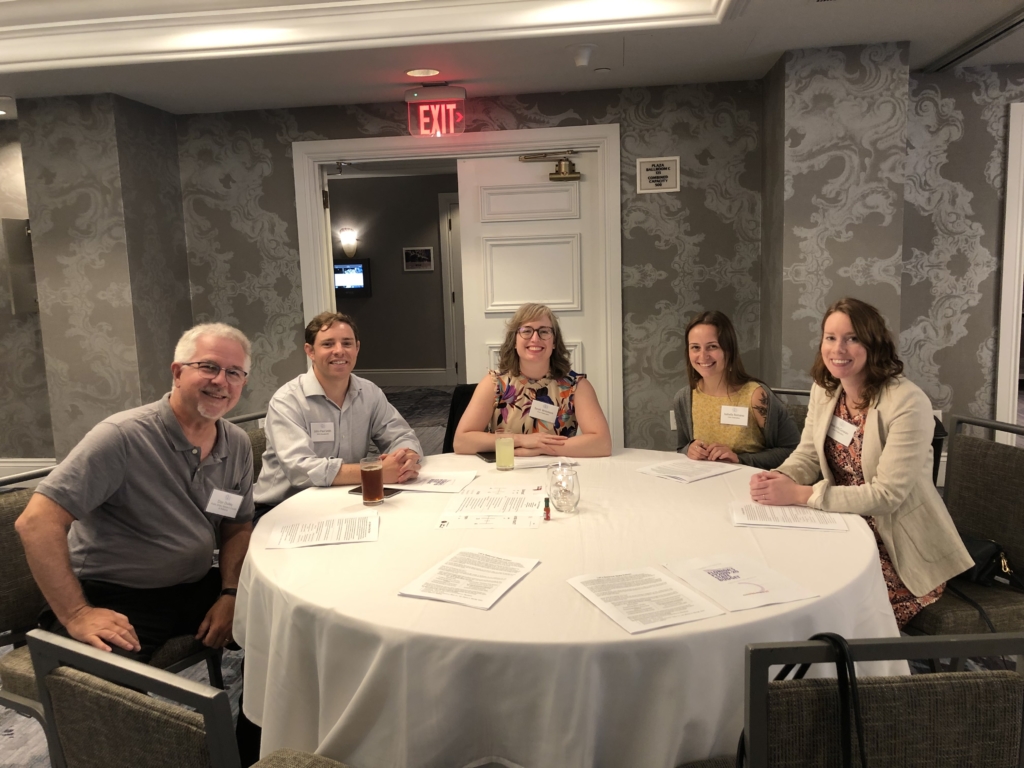

Day 2: Newsmakers, energy, environment, and more
On Monday morning, Dominic Calabro, president of Florida TaxWatch, provided welcoming remarks.
Then, Bill Nichols, vice president at Freedman Consulting, LLC and former founding managing editor and editor-at-large of POLITICO, talked about how research organizations can leverage the new media landscape to be their own newsmakers. Nichols, who is also on the team of Spotlight on Poverty & Opportunity, presented data on the decline of newspaper journalists and the lack of news coverage on the issue of poverty across the country.
But, despite this changing landscape, he left attendees with a hopeful message.
“Nonprofit journalism is the future … this democratization of media, this ability that the web has given us — that everyone can be their own publisher — that’s a very hopeful thing.” — Bill Nichols
Nichols on “the power to publish” and the power of partners. #2019GRA pic.twitter.com/E38EaXzqjs
— Mebane Rash (@Mebane_Rash) July 22, 2019
Bill Nichols is speaking at #2019GRA on the decline of journalism and why we have to be our own newsmakers. @TheGRA1914 pic.twitter.com/0YD4xZyTI4
— Joe Peterangelo (@jpeterangelo) July 22, 2019
“There are a whole host of topics we’ve never covered well…and poverty is at the top of that list.” —Bill Nichols // Of the ten states with the highest poverty rate, none have a dedicated poverty reporter at their largest news outlets. #2019GRA pic.twitter.com/yBxowDSjOC
— @GRA (@TheGRA1914) July 22, 2019
Then, participants had a chance to engage in two different policy spotlight and skills sessions. In the first round, participants chose between a panel on starting wage policy and a skills session on how to frame grants for policy research.
Kelly O’Brien, principal consultant of KTO Strategy & Communications, LLC, discussed barriers to funding and how to use logic models to frame grant requests.
Kelley O’Brien starting off our skills sessions at #2019GRA conference talking about grant writing and opportunities for grant funding @TheGRA1914 pic.twitter.com/yjptno1NAo
— Nancy Richmond Rose (@nrichrose) July 22, 2019
In the policy session, Jeff Hornstein, executive director of the Economy League of Greater Philadelphia, hosted a panel with representatives from Florida TaxWatch, Citizens Research Council of Michigan, Colorado Futures Center, and Massachusetts Taxpayers Foundation on the different approaches that states have taken to increase starting wages.
Next up, @jmhornstein of @EconomyLeague is leading a discussion on starting wage policy research with representatives from @FloridaTaxWatch, @crcmich, Colorado Futures Center, & the Massachusetts Taxpayers Foundation. #2019GRA pic.twitter.com/0JAHgMuUVK
— @GRA (@TheGRA1914) July 22, 2019
Check this out. We are looking at this tracker at #2019GRA https://t.co/IHQrRi2f8u Track minimum wage laws in every state with the EPI Minimum Wage Tracker pic.twitter.com/P1r2lxY1L2
— Mebane Rash (@Mebane_Rash) July 22, 2019
In the second round of policy spotlights and skills sessions, attendees chose between a panel on criminal justice and a skills session on hacking maps on a budget or a deadline. Peter Reichard, president of the Utah Foundation, Lisa Margulies, senior policy specialist at the Crime and Justice Institute, and Robert Weissert, executive vice president of Florida TaxWatch, discussed criminal justice policy and sentencing, release, community corrections, and sustainability.
Margulies says the research shows reducing prison population does not increase crime. #2019GRA pic.twitter.com/iqxL5t28cl
— Mebane Rash (@Mebane_Rash) July 22, 2019
At our session on criminal justice reform, Lisa Marguiles of @CR_Justice argued that ‘tough on crime’ is not necessarily ‘smart on crime.’ She showed that the prison population has decreased in recent years nationally, as has the crime rate. #2019GRA https://t.co/Yc9Zd9YaRd
— Joe Peterangelo (@jpeterangelo) July 22, 2019
Joe Adams, research coordinator at Public Affairs Research Council of Alabama, shared a variety of ways to quickly make maps or clean data sets.
Messy data? Joe Adams says there are services to help with cleaning it up. #2019GRA @TheGRA1914 pic.twitter.com/50erpaFyuf
— Nancy Richmond Rose (@nrichrose) July 22, 2019
Before lunch, John Reed, CEO and chairman of the board for Concentric Energy Advisors, and Catherine Stempien, state president of Duke Energy, discussed energy deregulation.
Learning more about energy deregulation and restructuring with John Reed with Concentric Energy Advisors and Catherine Stempien @DukeEnergy. #2019GRA pic.twitter.com/zMhifiCL47
— Mebane Rash (@Mebane_Rash) July 22, 2019
Catherine Stempien, state president of Duke Energy in Florida, says energy deregulation should never happen via ballot initiative. // “To the extent that these are complicated issues, they should be raised up in the legislature.” #2019GRA pic.twitter.com/eCHGqSvYkO
— @GRA (@TheGRA1914) July 22, 2019
In the final session of the day, Dr. Ellen Prager of Earth2Ocean, Inc. discussed the data behind climate change and why the unknowns shouldn’t drive policy.
Next up, Dr. @elprager shares climate change data & why the unknowns shouldn’t drive policy. #2019GRA pic.twitter.com/fqxRWli1jC
— @GRA (@TheGRA1914) July 22, 2019
Attendees ended day two of the conference by cheering on the Tampa Bay Rays at Tropicana Field.
Our #2019GRA conference attendees are enjoying a night at Tropicana Field, cheering on @RaysBaseball ⚾️ pic.twitter.com/9Q8kng51Sl
— @GRA (@TheGRA1914) July 23, 2019
Focusing on school leaders
Throughout the conference, brief multimedia sessions provided perspectives on school leaders. Mebane Rash shared the story of EducationNC’s work in Edgecombe County around chronic absenteeism, playing a video of the day we walked the streets with Miracle, a student, listening to her reasons for why students don’t come to school.
“We realized that sometimes, people do education research without actually talking to students, or teachers, or school leaders.” // @Mebane_Rash shares the work of @EducationNC on chronic absenteeism in Edgecombe County. #2019GRA pic.twitter.com/kiYfl8affA
— @GRA (@TheGRA1914) July 22, 2019
Patrick Archer, a teacher in Memphis, Tennessee, shared his perspective on the role of school leaders and lessons learned after the first year of teaching.
School leaders are the nexus for education stakeholders: students, teachers, parents, the district, local boards, the state, says @PArch0216, a first year teacher. #2019GRA pic.twitter.com/e9dhDxbHJR
— Mebane Rash (@Mebane_Rash) July 22, 2019
Florida TaxWatch shared this video on nine exceptional principals who were recognized for their outstanding leadership and positive influence on students.
To close out our discussion of school leaders, we shared this video from Opportunity Culture on how schools provide on-the-job, consistent support for all teachers to reach many more students by having teachers lead teams or reach more students directly, with more school-day collaboration and planning time, and without forcing class-size increases.
Day 3: Priorities projects, people-centered policy, and more
On Tuesday morning, Criketa Matlock welcomed young members and newcomers to the GRA conference with a game of human bingo.
Cree Matlock welcomes newcomers to the #2019GRA @TheGRA1914 pic.twitter.com/PaUD76PJv7
— Nancy Richmond Rose (@nrichrose) July 23, 2019
My colleague @CriketaMatlock with Public Affairs Research Council Louisiana is a believer that “people are policy.” She says diversity is imperative to good policy and good government and is the pathway to real change. Amen. #2019GRA pic.twitter.com/ItV2TxLxMb
— Mebane Rash (@Mebane_Rash) July 23, 2019
Then, David Casey, senior vice president at MAXIMUS, and Marsha Simon, president of MJ Simon & Company, discussed OPM’s recent clarification on state contractors — and important change in many states especially during recessions and disasters.
Learning about the biggest change in federal-state relations you haven’t heard of. A new rule in the @fedregister may unleash state-based innovation, improve programs and outcomes across federally-funded entitlement programs w/ David Casey @MAXIMUS_news, Marsha Simon. #2019GRA pic.twitter.com/3hy35L7pzG
— Mebane Rash (@Mebane_Rash) July 23, 2019
“Our interest is making these programs work better for the people they serve. And frankly, right now they don’t.” —Marsha Simon, president of MJ Simon & Company, on the entitlement system. #2019GRA pic.twitter.com/QXLFoLxEPf
— @GRA (@TheGRA1914) July 23, 2019
During a third and final spotlight and skills session, participants chose between a panel on medicaid expansion and healthcare or a skills session on social media boosting and surveying.
Timothy Michling, research associate at Citizens Research Council of Michigan, Jason Stein, research director of the Wisconsin Policy Forum, and Shawn Teigen, vice-president and research director at Utah Foundation, discussed medicaid expansion and healthcare.
What is a “Health Risk Assessment” in the Healthy Michigan Plan? @crcmich provides some examples at #2019GRA pic.twitter.com/1XH8pDuBA2
— @GRA (@TheGRA1914) July 23, 2019
Analisa Sorrells, chief of staff and associate director of policy for EducationNC, shared social media tips and walked participants through how to boost their content to new audiences on Facebook.
.@EducationNC’s @analisasorrells session on social media boosting and surveying starts now! @TheGRA1914 #2019GRA pic.twitter.com/IYzzqNtakA
— Nancy Richmond Rose (@nrichrose) July 23, 2019
Before lunch, Jen Zuckerman, director of strategic initiatives at the World Food Policy Center, shared the importance of understanding history and developing relationships to plan for the future. Zuckerman called attention to the historic disinvestment in communities that resulted in wealth disparities and, ultimately, food deserts.
Jen Zuckerman, director of strategic initiatives at @DukeWFPC, says listening is core to the center’s values. // “We need to listen better than anyone else, and we need to listen in a way that we are there to understand, not listen waiting to respond.” pic.twitter.com/2jkKBZNTsC
— @GRA (@TheGRA1914) July 23, 2019
Zuckerman traces the connections between redlining ➡️ wealth ➡️ food deserts in Charlotte, North Carolina, showing how the maps line up with one another. @DukeWFPC #2019GRA pic.twitter.com/SQXv3f934Z
— @GRA (@TheGRA1914) July 23, 2019
Over lunch, representatives from numerous GRA organizations — including EducationNC, the Utah Foundation, Colorado Futures Center, and the Public Affairs Research Council Alabama — shared the work they have done in using priorities projects to lift up citizen voice to shape public policy and inform elections.
Kicking off a discussion about using priorities projects to lift citizen voice up in the 2020 election. #2019GRA @TheGRA1914 pic.twitter.com/jKfhdqF41H
— Nancy Richmond Rose (@nrichrose) July 23, 2019
The amazing Shawn Teigan walks us through @UtahFoundation’s priorities project, which has been shaping policy and informing elections since 2004! #2019GRA pic.twitter.com/9e5BmmauJC
— Mebane Rash (@Mebane_Rash) July 23, 2019
Attendees then enjoyed an afternoon at the nearby Dali Museum.
On Tuesday evening, Jeff Chapman, director of state fiscal health at Pew Charitable Trusts, discussed preparing states for upcoming fiscal and economic challenges.
Meet Jeff Chapman @pewtrusts. He’s the director of their state fiscal health initiative, and he’s helping us assess whether states are prepared for the next recession. Thankful for his leadership. #2019GRA pic.twitter.com/ITE5JhRjTv
— Mebane Rash (@Mebane_Rash) July 23, 2019
Let’s start talking NOW about the right cuts when the next recession hits, says Jeff Chapman @pewterusts. #2019GRA pic.twitter.com/uQDzOkKcon
— Mebane Rash (@Mebane_Rash) July 23, 2019
In a final keynote, Tom Ross, president of the Volcker Alliance, discussed democracy, state governments, and the aging of the federal workforce.
@VolckerAlliance Tom Ross: democracy is fragile, less confidence in outcome of elections, gerrymandering has led to gridlock and a lack of faith in institutions. Trust in govt down below 20% for feds. #2019GRA pic.twitter.com/rYVNZaYESU
— Jeff Hornstein (@jmhornstein) July 23, 2019
To close the day, GRA awards were presented in three categories: distinguished research, most effective education, and outstanding policy achievement.
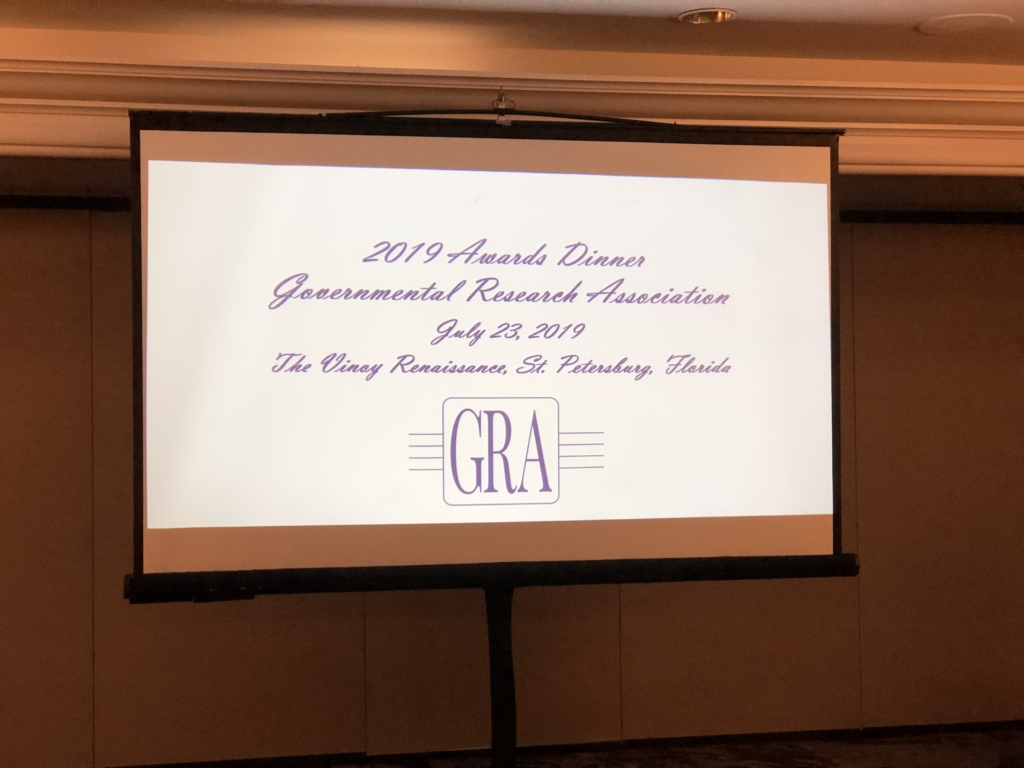

The Frederick P. Gruenberg Award was presented to Sam Tyler of the Boston Municipal Research Bureau for his “unwavering commitment and outstanding contributions to the field of governmental research and the GRA.”
Day 4: Award presentations
Following the GRA annual meeting on Wednesday morning, Dean Mead, senior research manager and GASAC Coordinator at GASB provided an update on the Governmental Accounting Standards Board.
Dean Mead @FAFNorwalk updating #2019GRA on #GASB. “You are my people,” he says. pic.twitter.com/llZz2dMYMj
— Mebane Rash (@Mebane_Rash) July 24, 2019
Award winners shared IGNITE presentations on their research.
Stephen Stuart @BGRNola briefing us on their research, “The Lost Penny: An Analysis of the Orleans Parish Hotel Tax Structure,” winner of @TheGRA1914’s most distinguished research award. ? ? ? #2019GRA pic.twitter.com/yz7pEwIn6V
— Mebane Rash (@Mebane_Rash) July 24, 2019
Susie Dudis @BGRNola briefing us on their research, “Improving a Tax Proposal for Jefferson Parish Public Schools, “ which won @TheGRA1914 award for outstanding policy achievement. #2019GRA pic.twitter.com/KEKft0pE7H
— Mebane Rash (@Mebane_Rash) July 24, 2019
The incredible Ryan Hankins at the Public Affairs Research Council of Alabama briefing us on their research, “Good Neighbor Pledge,” which won a certificate of merit from @TheGRA1914 for outstanding policy achievement. #2019GRA pic.twitter.com/kYt1y7ilcx
— Mebane Rash (@Mebane_Rash) July 24, 2019
Jordon Newton and Tim Michling @crcmich briefing us on their research, “Statewide Ballot Analyses — 2018,” winner of @TheGRA1914 award for most effective education. #2019GRA ? ? ? pic.twitter.com/UEz6xwAiea
— Mebane Rash (@Mebane_Rash) July 24, 2019
Peter Reichard @UtahFoundation briefing us on their research, “Utah Quality of Life Project,” winner of @TheGRA1914 certificate of merit for most effective education. #2019GRA ? ? ? pic.twitter.com/Wm5TI5Fqxp
— Mebane Rash (@Mebane_Rash) July 24, 2019
Thank you to Florida TaxWatch, MAXIMUS, EducationNC, and Brian Auld, president of the Tampa Bay Rays, for their support of this conference.
Heading out today from St. Petersburg after #2019GRA. Thank you @FloridaTaxWatch and @EducationNC @Mebane_Rash for bringing together great speakers, ideas – and of course our @TheGRA1914 colleagues. pic.twitter.com/9xj1JXV0iM
— Stephen Stuart (@stephenbstuart) July 24, 2019
PS. Wonks are fun. #2019GRA pic.twitter.com/pUCrqwv4r7
— Mebane Rash (@Mebane_Rash) July 24, 2019
